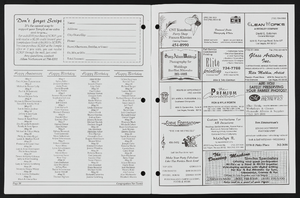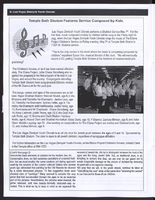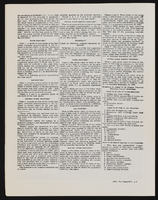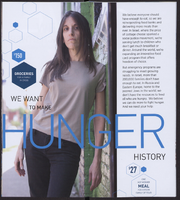Search the Special Collections and Archives Portal
Search Results

Transcript of interview with Michael J. Signorelli by Claytee D. White, Stefani Evans, August 4, 2016
Date
Archival Collection
Description
Michael Signorelli, long-time Las Vegas resident and builder of many local homes, apartments and hotels, describes his upbringing, career, and stellar reputation as part of the “Building Las Vegas” oral history project. Raised in Rhode Island, the only child of an Italian-American father and a Southern Baptist mother, Michael’s early life was influenced by his father’s disability as a World War Two veteran and his non-English speaking paternal grandparents, who owned and ran a grocery store. Talking of his experiences in helping them run the grocery store he says, "I became a businessman at the age of twelve." His military service during the Vietnam War landed him at Nellis Air Force Base in Las Vegas. Once here, Michael furthered his education at UNLV, obtaining both his MEd and PhD degrees. In Las Vegas Michael began his work in the housing arena working for Sun Home Builders and his non-profit work, helping to raise funds for the newly formed Rape Crisis Center. Signorelli went on to work for Howard Hughes's Summa Corporation, where he successfully fought against a discrimination lawsuit brought by twenty-one female dealers. In 1978 Michael started his own company, Nicro Corporation, and began building homes in the Las Vegas valley with land he acquired on a hand-shake and a verbal contract. He continued his non-profit work, which included coordinating Lady Bird Johnson’s Green Thumb project for Nevada and the Pacific Northwest. In the 1980s Signorelli was recruited by the Fitzgerald Group, where he was involved in non-gaming operations for their many hotels, cattle ranch, and an in vitro clinic. In this interview, Signorelli describes his non-Las Vegas building projects in Mesquite and Laughlin. He built the Mesquite Star hotel and casino by overcoming multiple hurdles around water access and money. Despite twice obtaining a loan for one hundred million dollars, he was never able to successfully complete the Laughlin hotel and casino, due to legal issues from his partner’s family trust. Signorelli also shares his idea for a unique hotel and casino called the Nev Star that involved his successful negotiation of a waiver to Senate Bill 208. Signorelli concludes his interview by talking about his ownership of the world-famous Golden Steer Steak House restaurant, which opened in 1958. Under Signorelli’s ownership the Golden Steer has been featured in national publications and claims many legendary fans such as NACAR driver Mario Andretti, who in 2016 celebrated his seventy-six birthday at the Golden Steer. Signorelli’s love of Las Vegas and its many positive traits come forth as he talks about his daughter and her achievements and suggests Vegas promoters should do a better job about what great schools, medical care, and government we have in Las Vegas.
Text

Transcript of interview with Norma Morrow Zuckerman by Barbara Tabach, April 18, 2016 & March 13, 2017
Date
Archival Collection
Description
Norma Morrow Zuckerman is the driving force behind the Jewish Repertory Theatre of Nevada [JRTN], an organization she co-founded with Charlene Sher in 2010. The endeavor coincided with Norma’s pursuit of an MFA at UNLV a couple of years prior. With the commitment to her studies and to bring professional Jewish theatrical performances to Las Vegas, her energetic personality intensified. In 2007, she performed in The Diary of Anne Frank and noted the audience was supporting Jewish Family Services Agency. Norma could sense the community’s eagerness for professional theatre and she was just the one to deliver it. Over the following years, JRTN produced an array of Jewish-themed and acted plays. Since then she tries to bring The Diary of Anne Frank to the stage annually and finds partners to bring 1400 eighth graders to the performance. By 2012, her commute between Los Angeles, where she is a garment designer/manufacturer with her husband Eugene, and Las Vegas had become routine and her passion for professional theatre in Las Vegas increased. This was the year that The Smith Center for Performing Arts opened. The first theatrical production was Golda’s Balcony, a one-woman drama starring Tovah Feldshuh. It was the spectacular co-promotion by Norma’s JRTN and the Smith Center. Norma was smitten with the theatre from a young age and studied with some of the best acting coaches—Milton Kastelas, Stella Adler, Wynn Handman. In this oral history she recalls the people who have helped her, the performances that have charmed audiences and the value of live theatre.
Text

Michael Arage oral history interview: transcript
Date
Archival Collection
Description
Oral history interview with Michael Arage conducted by Dalton DuPré on November 12, 2021 for Reflections: The Las Vegas Asian American and Pacific Islander Oral History Project. In this interview, Michael Arage discusses his upbringing in the Greater Toronto Area (GTA), Ontario, Canada with his sister and his Filipino-Palestinian heritage. He talks about how his parents immigrated to the United States, his life and education in Toronto, and his relocation to Los Angeles, California where he married his wife. Michael Arage shares how the couple moved to Las Vegas, Nevada in 2012 when his wife started a job at Zappos. Because he lacked a work visa, Michael Arage began playing poker and working in sports betting. In 2019, he founded a community organization to support the people of Palestine, called Nevadans for Palestinian Human Rights. Michael Arage talks about his activism efforts, anti-Arab racism, his cultural upbringing, and of Filipino and Arabic foods and customs. He also shares his views of living in Las Vegas, the difficulties of raising a child away from her cousins, and differing governmental policies and healthcare between Canada and the United States.
Text

Zoe Albright oral history interview: transcript
Date
Archival Collection
Description
Oral history interview with Zoe Albright conducted by Barbara Tabach on October 16, 2018 for the Remembering 1 October Oral History Project. In this interview, Albright describes her work as a volunteer for the Red Cross and helping comfort those who came into the Metro Police Station after the 1 October shooting, searching for family and friends who were present at the Route 91 Harvest Festival. In addition to being a Red Cross volunteer, Albright is also a personal trainer, nutrition consultant and resident of Las Vegas since 1988.
Text
UNLV University Libraries Collection on Nevada Mining
Identifier
Abstract
The Nevada Mining Collection is comprised of records that document mining and mines in Nevada from 1842 to 1966. The majority of the collection includes records of various mines and mining companies located in the Esmeralda, Lincoln, Clark, White Pine, and Nye counties, dating from 1900 to 1928. The collection includes financial, administrative, and business related records; photographs of miners, mining camps, and towns; correspondence; maps; newspaper clippings, pamphlets, newsletters, and booklets.
Archival Collection
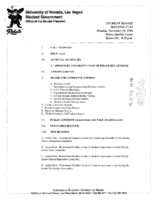
Meeting minutes for Consolidated Student Senate University of Nevada, Las Vegas, November 18, 1996
Date
Archival Collection
Description
Text

